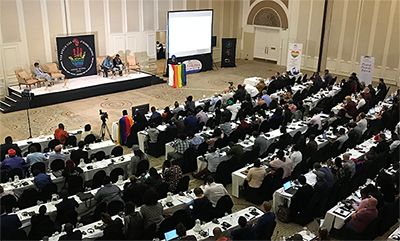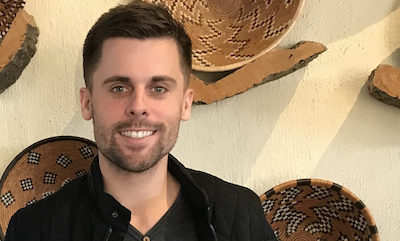In Botswana, Botho Means Everyone Is Connected, Including the LGBTQI Community.
 It is winter in Botswana, the dry season, but it was raining on a recent morning in the country’s capital, Gaborone, when a group of activists and MPH student Thomas Lee arrived at the High Court.
It is winter in Botswana, the dry season, but it was raining on a recent morning in the country’s capital, Gaborone, when a group of activists and MPH student Thomas Lee arrived at the High Court.
LeGaBiBo (Lesbians, Gays, and Bisexuals of Botswana) is the country’s first and leading advocacy group for sexual and gender minorities. The organization is amicus curiae in the case of a gay man, known as LM, challenging parts of the country’s penal code that technically ban anal sex between partners of any gender, but are only enforced against men who have sex with men, transgender women, and sometimes even women who have sex with women, a de facto legal interpretation that spills over into discrimination in every area from healthcare to housing to employment.
This, however, was not LeGaBiBo’s day in court. They were told a clerical error left the case off of the judge’s docket, and, for the second time this year, the hearing is postponed to an unknown future date.
On the steps of the court, LeGaBiBo’s CEO, Anna Mmolai-Chalmers, made a statement. “They were going to continue to do everything that they could do legally,” says Lee, who is completing a practicum with the group thanks to the Santander University Scholars Program. “They were confident that fairness, justice, dignity, and equality will be served, and that it will be served by the judicial system in this country.”
 LeGaBiBo plays the long game, Lee says. They spent years fighting for legal recognition as an advocacy organization. When they won in court in 2014, the government appealed the decision, but LeGaBiBo won again in 2016.
LeGaBiBo plays the long game, Lee says. They spent years fighting for legal recognition as an advocacy organization. When they won in court in 2014, the government appealed the decision, but LeGaBiBo won again in 2016.
Lee says he has wanted to work with LeGaBiBo since he learned about their registration battle while he was serving in the Peace Corps in nearby Mozambique. Lee was focusing on people living with HIV and on gender equity, and, as a gay man, he wanted to continue working on these and other issues that intersect in the lives of sexual and gender minorities. He also wanted to continue working in the region, so, when he came to the School of Public Health, he decided to complete certificates in Sex, Sexuality, and Gender and in African Studies.
During his time in Gaborone, Lee is focusing on resource mobilization, helping come up with a strategy to better reach out to donors and gather potential new sources for funding. He is also helping establish guidance and policy for the organization’s new drop-in center, organizing a focus group and facilitating dialogue to better understand the needs of the community.
Civil rights battles are long, but practicums are short, Lee says, so he is also using this opportunity to lay the groundwork to return and continue helping LGBTQI rights efforts in the region long-term. Perhaps particularly in global health, he says, coming to a new place, regardless of past experience and education, requires time to form relationships and learn about a community and a context before diving into the work. The connections—and mistakes—he makes now will make him a more effective and helpful advocate and organizer when he returns, he says.
His biggest opportunity to make connections was helping with logistics and general volunteering during the Pan-Africa International Lesbian Gay Bisexual Transgender Intersex Association (ILGA) annual conference, which LeGaBiBo recently co-hosted in Gaborone at the beginning of June. The conference included 300 participants from 34 African countries, as well as participants from 17 other countries representing global groups including Human Rights Campaign and Outright. Lee had the chance to make personal connections with local volunteers and international advocates alike, he says.
One of the reasons Lee says he wanted to work with LeGaBiBo was because of the organization’s success getting international attention and challenging Western perceptions of the state of Africa’s sexual and gender minorities. “You don’t hear as much about places like Botswana, where there’s actually pretty high favorability, there’s a higher level of tolerance, and there’s a more open dialogue going on that you don’t see in a lot of other countries,” he says.
By way of example, he points to the international headlines when Botswana deported Steven Anderson, an American pastor touring the African continent while calling for the death penalty for sexual and gender minorities. In a radio conversation with one of the leaders of LeGaBiBo, Caine Youngman, Anderson called for stoning people to death. In response, the president of Botswana ordered the pastor arrested and revoked his visa.
“Batswana were calling into the radio station,” Lee says, using the plural word for people from Botswana. “They were saying things like, ‘I also don’t agree that homosexuality is OK in a religious context, but I don’t like how this pastor is speaking to one of our own people, and his inability to have a dialogue,’” Lee says. That distinction is part of a cultural concept called botho, Lee says. “It’s this idea of human dignity, our interconnectedness, and treating people with humanity and respect. The organization does a lot around this cultural concept to get Batswana to be more tolerant and more supportive of the rights and health of the LGBTQI people here.”
Whose job it is to bring about that support is another narrative he wants to help challenge. Lee was in Mozambique when his home state of Virginia and then the entire US legalized same-sex marriage. “I thought, ‘Oh no, I’m missing it!’” Lee recalls. “But then I realized, no, I’m not missing it, because it’s a global movement.” Lee says many Americans thought of marriage equality as the end of the fight. “It’s not done,” he says. As part of his future work in this area, he says he wants to help bridge the gap between Western and African LGBTQI communities, and encourage the former to recognize and support the latter.
“We’re all connected,” Lee says, echoing the concept of botho, “and there’s a lot that needs to be done.”
Thomas Lee is taking over the SPH Instagram account from June 11 through 15 to share photos from Botswana. Follow along at Instagram.com/BUSPH/ and with the hashtag #BUSPHSummer18.